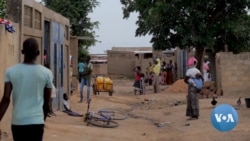Burkina Faso is holding elections on November 22 but more than 400,000 people displaced by armed conflict are unable to vote.
Fighting between Burkina Faso’s military and Islamist militants has displaced more than a million people — half of them this year alone.
Ougadougou’s Pazani suburb hosts nearly 3,000 displaced, including Fatoumata Ouedraogo who lives in a tiny house, hastily built from cinder blocks, with her five children.
They fled Silgadji village last year after armed men killed six of their neighbors.
She says they used to farm in the village and sell the produce at the local market. But they had to leave, says Ouedraogo, because of the terrorists who came and killed people.
Over 400,000 displaced people like Ouedraogo won’t be able to vote in Burkina Faso’s November 22 elections as they lost identification papers or weren’t offered registration.
The government says it was not possible to register voters in areas of the country overrun by armed groups.
At the Independent Electoral Commission, workers are busy preparing millions of ballots for the election.
Commission spokesman Yacouba Ouedraogo says people in unsafe areas can travel to register elsewhere and still vote.
He says they don't know why some people did not come to register. Maybe they don't have documents, says Ouedraogo, adding that he insists they will receive any Burkinabe that has all the required documents for registration.
Political analysts say Burkina Faso authorities are balancing the security challenge with the need for democratic elections, but also taking a risk.
Judd Devermont is the Africa Program Director at the Center for Strategic and International Studies in Washington D.C.
“The inability of many Burkinabe to vote in this election is a considerable challenge. Of course, if five out of the thirteen regions are unable to vote it will leave a clot of illegitimacy around whoever is elected,” he said.
Troops from West Africa, France, and the U.S. have struggled since 2013 to fight a growing terrorist insurgency in the Sahel region, with attacks nearly doubling every year.
The U.S. State Department and rights groups have accused Burkina Faso’s security forces of abuses and killings of civilians, fueling terrorist recruitment.
At her tiny house, Fatoumata Ouedraogo says if she could vote, she would vote for change.
"I would vote for the party able to ensure we can go back to our home village, and have access to water, food and security," she said.
Meanwhile, unable to farm, Ouedraogo ekes out a living collecting sand to sell to builders.





